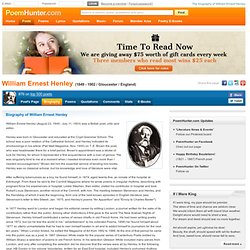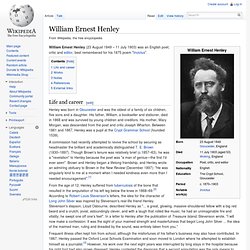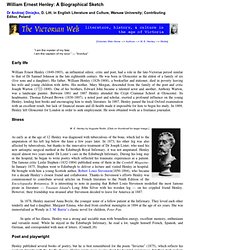

Invictus by William Ernest Henley. The biography of William Ernest Henley. William Ernest Henley (August 23, 1849 - July 11, 1903) was a British poet, critic and editor.

Henley was born in Gloucester and educated at the Crypt Grammar School. The school was a poor relation of the Cathedral School, and Henley indicated its shortcomings in his article (Pall Mall Magazine, Nov. 1900) on T. E. Brown the poet, who was headmaster there for a brief period. Brown's appointment was a stroke of luck for Henley, for whom it represented a first acquaintance with a man of genius. After suffering tuberculosis as a boy, he found himself, in 1874, aged twenty-five, an inmate of the hospital at Edinburgh. In 1877 Henley went to London and began his editorial career by editing London, a journal written for the sake of its contributors rather than the public.
This page is based on the copyrighted Wikipedia William Ernest Henley; it is used under the Creative Commons Attribution-ShareAlike 3.0 Unported License. William Ernest Henley. William Ernest Henley (23 August 1849 – 11 July 1903) was an English poet, critic and editor, best remembered for his 1875 poem "Invictus".

Life and career[edit] Henley was born in Gloucester and was the oldest of a family of six children, five sons and a daughter. His father, William, a bookseller and stationer, died in 1868 and was survived by young children and creditors. His mother, Mary Morgan, was descended from the poet and critic Joseph Wharton. Between 1861 and 1867, Henley was a pupil at the Crypt Grammar School (founded 1539). A commission had recently attempted to revive the school by securing as headmaster the brilliant and academically distinguished T. From the age of 12, Henley suffered from tuberculosis of the bone that resulted in the amputation of his left leg below the knee in 1868–69.[2] According to Robert Louis Stevenson's letters, the idea for the character of Long John Silver was inspired by Stevenson's real-life friend Henley. Works[edit] William Ernest Henley: A Biographical Sketch. “I am the master of my fate: I am the captain of my soul.” — “Invictus” Early life William Ernest Henley (1849-1903), an influential editor, critic and poet, had a role in the late-Victorian period similar to that of Dr Samuel Johnson in the late eighteenth century.

He was born in Gloucester as the eldest of a family of six (five sons and a daughter). His father, William Henley (1826-1868), a bookseller and stationer, died in poverty leaving his wife and young children with debts. His mother, Mary Morgan, descended from the family of the poet and critic Joseph Warton (1722-1800). Illness W.
As early as at the age of 12 Henley was diagnosed with tuberculosis of the bone, which led to the amputation of his left leg below the knee a few years later. In 1878, Henley married Anna Boyle, the younger sister of a fellow patient at the Infirmary. In spite of his illness, Henley was a strong and sociable man with boundless energy, excellent memory, enthusiasm and versatile mind. Master of fate. Nouns - What is the meaning of "pole to pole" here? Invictus - Poem That Inspired A Nation. Explication of "Invictus"